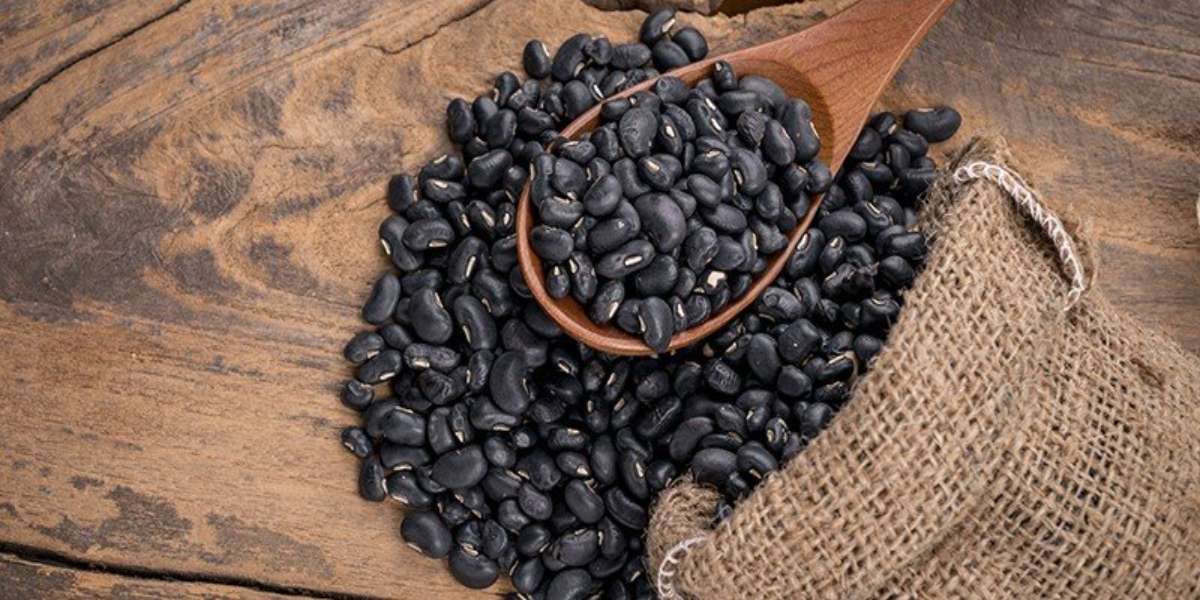Should you drink Soy Milk every day?
Should you drink Soy Milk every day?
I see a lot of people taking soy milk daily as breakfast. Perhaps for various reasons, they haven't enough time to eat a decent breakfast or they have no a habit of having breakfast. Whatever the reason, you should consider whether or not you should drink soy milk daily. You should know both the benefits and the side effects of this milk.
Soy milk is high in protein. This plant-based source of protein is very healthy and beneficial for the healthy muscles and other organs. The forms of B vitamins found in soy milk are important for helping the body maintain nerve cells and DNA. They also help you avoid some forms of anemia, which can prevent tiredness and fatigue.
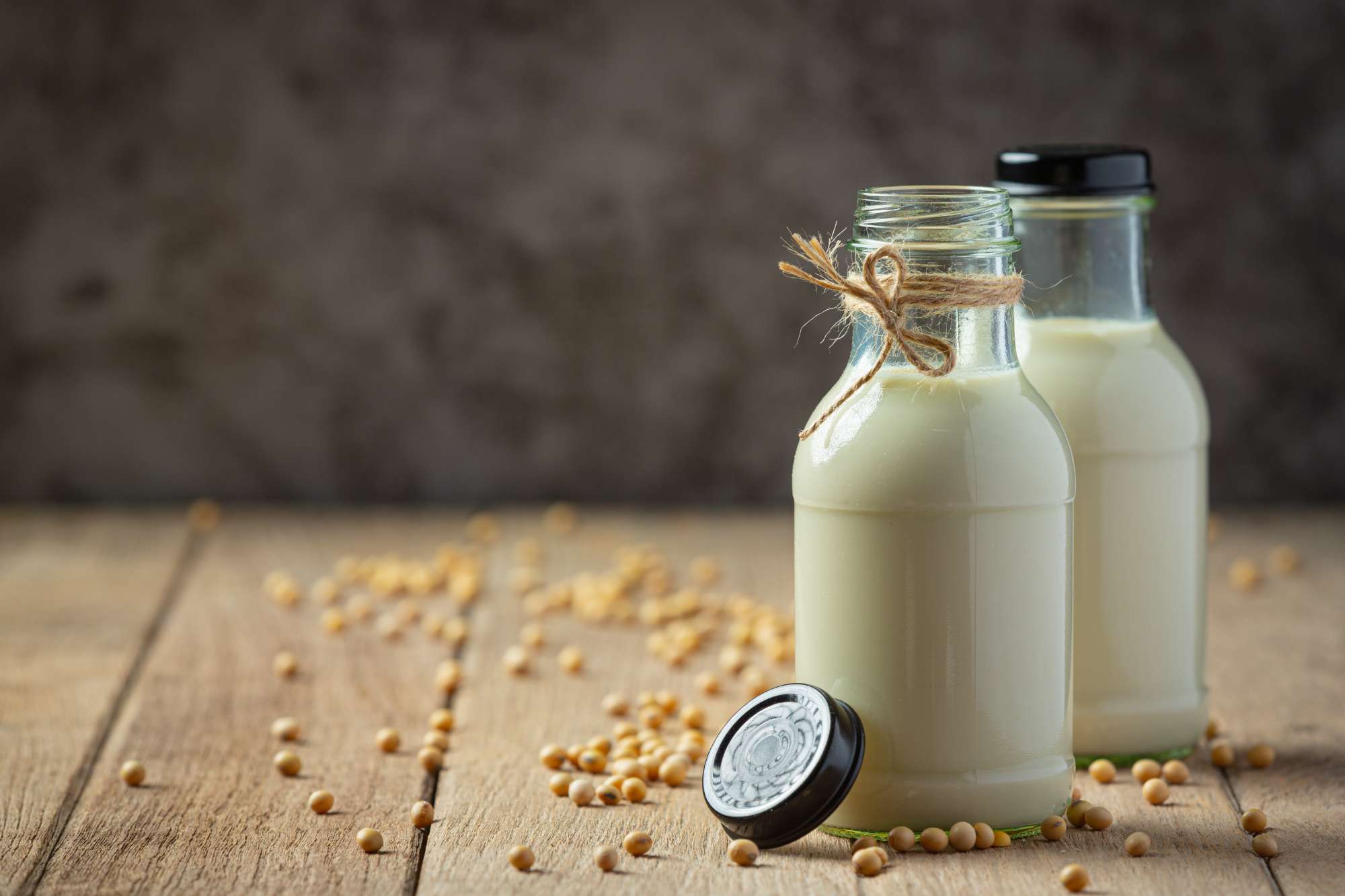
Nutrients in 100grams of whole soybeans:
General value: Calories: 172; Water: 63%; Protein: 18.2gr; Carbs: 8.4gr; Sugar: 3gr; Fiber: 6gr; And Fat: 9gr, in which, saturated fat: 1.3gr, monounsaturated fat: 1.98gr, polyunsaturated fat: 5.06gr.
Vitamins: √ Vitamin K1. The form of vitamin K found in legumes is known as phylloquinone. It plays an important role in blood clotting.
√ Folate, also known as vitamin B9. Folate is needed for cell growth, amino acid metabolism, the formation of red and white blood cells and proper cell division.
√ Thiamine, also known as vitamin B1. Thiamine plays an essential role in metabolism, by helping to convert nutrients into energy.
Minerals: √ Molybdenum. Soybeans're rich in Molybdenum, which is an essential mineral that plays a very important role in many processes in your body. In particular, Molybdenum activates Sulfite oxidase which is one of the four essential enzymes that help break down sulfites. Sulfites are found naturally in foods and are also sometimes added as a preservative, if they build up in the body they can cause allergic reactions include diarrhea, problems with skin or even make difficult to breathe. Molybdenum present in many food sources such as legumes, grains, fruits, vegetables and organ meats, especially liver and kidneys. Furthermore, the body only needs a very small amount of Molybdenum. For this reason, people usually don't need a supplement, unless for some specific medical reason.
√ Copper. Deficiency of copper may have adverse effects on heart health.
√ Manganese. It is an essential trace mineral for the body. It is found in most foods, especially in nuts and whole grains. Manganese is poorly absorbed from soybeans due to its high phytic acid content. Manganese supports the normal functioning of the brain, nervous system, and many other enzyme systems. Manganese also helps the body absorb vitamins, such as choline, thiamine, and vitamins C and E.
√ Phosphorus. Soybeans are a good source of phosphorus which is the second most abundant mineral in the human body (first is calcium). The body needs phosphorus to build strong bones and teeth, to produce energy and to strengthen muscles. It is also involved in muscle contraction, blood clotting, kidney and nerve function, tissue and cell regeneration and ensures a normal heart rhythm.
Other plant compounds:Soybeans are rich in various bioactive plant compounds, including:
√ Isoflavones, this is a family of antioxidant polyphenols, isoflavones have a variety of health effects.
√ Phytic acid. Found in all plant seeds, phytic acid (phytate) impairs the absorption of minerals like zinc and iron. Levels of this acid can be reduced by boiling, sprouting, or fermenting the beans.
√ Saponins. One of the main classes of plant compounds in soybeans, saponins have been found to reduce cholesterol in animals.
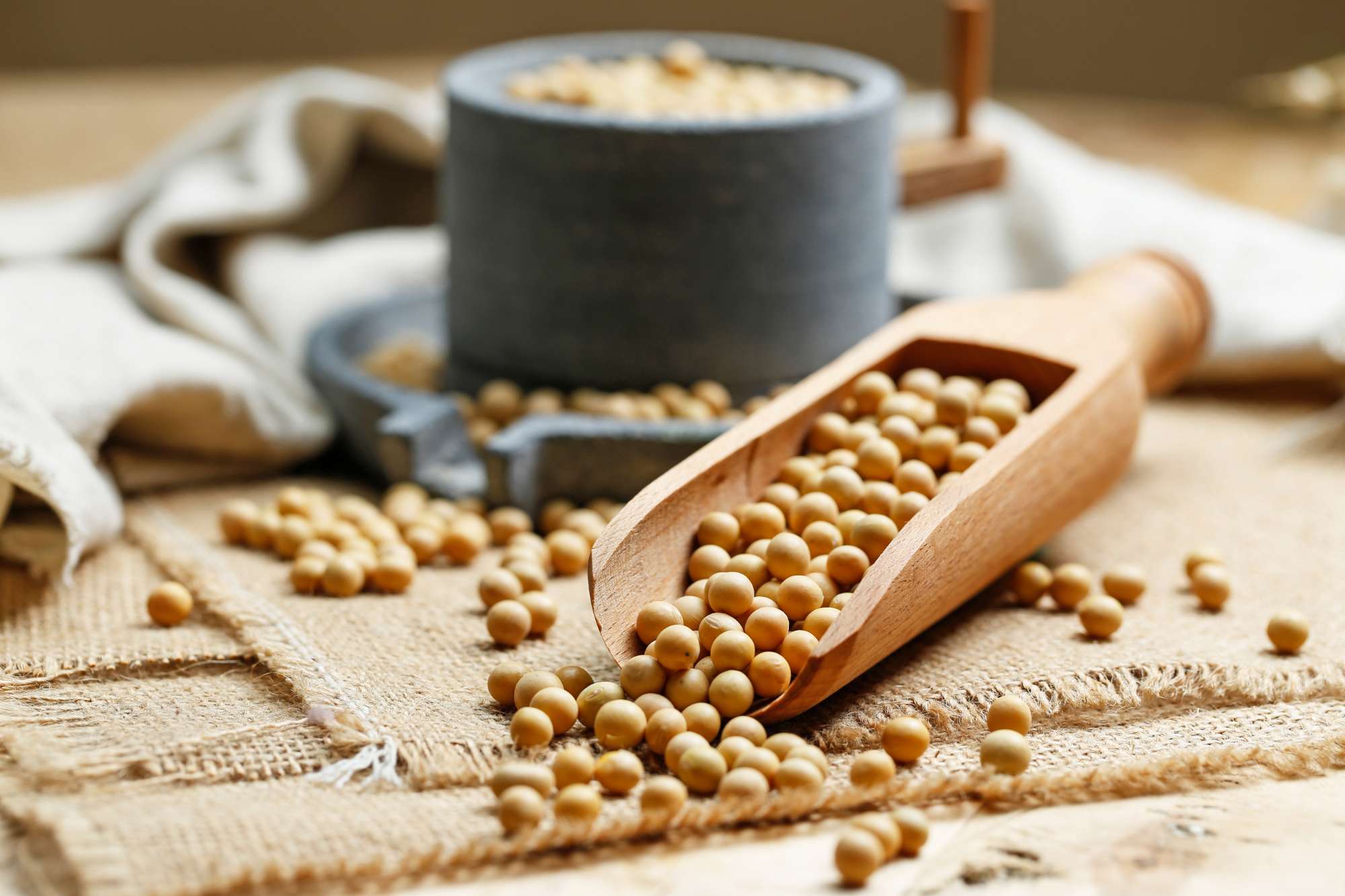
Nutrients get in a glass of soy milk:
Soybeans are rich in a variety of nutrients, making soy milk a nutritious beverage. Soy milk nutrition varies depending on whether it’s sweetened or unsweetened and if it’s fortified with vitamins and minerals.
The nutrition provided by one cup about 240 mL of unsweetened soy milk:
√ Calories: 80
√ Fat: 4grams
√ Carbs: 4grams
√ Protein: 7grams
Unfortified, unsweetened soy milk is a good source of vitamin B1, vitamin B6, magnesium, folate, zinc, calcium, and phosphorus.
Sweetened varieties typically contain cane sugar and provide around 5 - 15 grams of added sugar per serving.
Many popular brands of soy milk are fortified with vitamins and minerals like riboflavin, calcium, and vitamins A, B12, and D. Some brands also fortify vitamin K and iron in unsweetened soy milk.
.jpg)
HEALTH BENEFITS OF SOY MILK Soy milk may give a variety of health benefits
May help to improve cholesterol
High cholesterol is a major risk factor for heart disease. Triglycerides are a type of lipid or fat in the blood that, when elevated, can increase the risk of stroke and heart disease.
The protein and isoflavones content in soy milk are thought to be associated with beneficial effects on cholesterol and triglyceride levels. Isoflavones are a type of beneficial plant compound found mainly in soybeans.
In one review, 5 out of 8 studies reported significant improvements in LDL (bad) and HDL (good) cholesterol as well as triglycerides in people who consumed one cup of about 240 mL or more than four cups about 1liter soy milk daily for 4–8 weeks.
May help to reduce high blood pressure
Like as high cholesterol, high blood pressure is also a risk factor for heart disease, and also increases the risk of kidney disease.
There have been many studies that showed the plant compound isoflavones found in soybeans have the effect of lowering blood pressure.
Specifically, a small study from 2002. There were 40 people with high blood pressure who were selected to participate in this study. They were divided into two groups. One group was given about a liter of soy milk per day, the other about a liter of cow's milk per day, for three months. The results of the study showed that blood pressure levels were reduced in both groups. And the results also showed that people who drank soy milk had 92% more systolic blood pressure and 77% higher diastolic blood pressure than those who drank cow's milk. This suggests that, although protein has been shown to have beneficial effects on blood pressure, but the researchers in this study demonstrated soy milk’s blood-pressure-lowering effects with the drink’s content of a specific isoflavone called genistein.
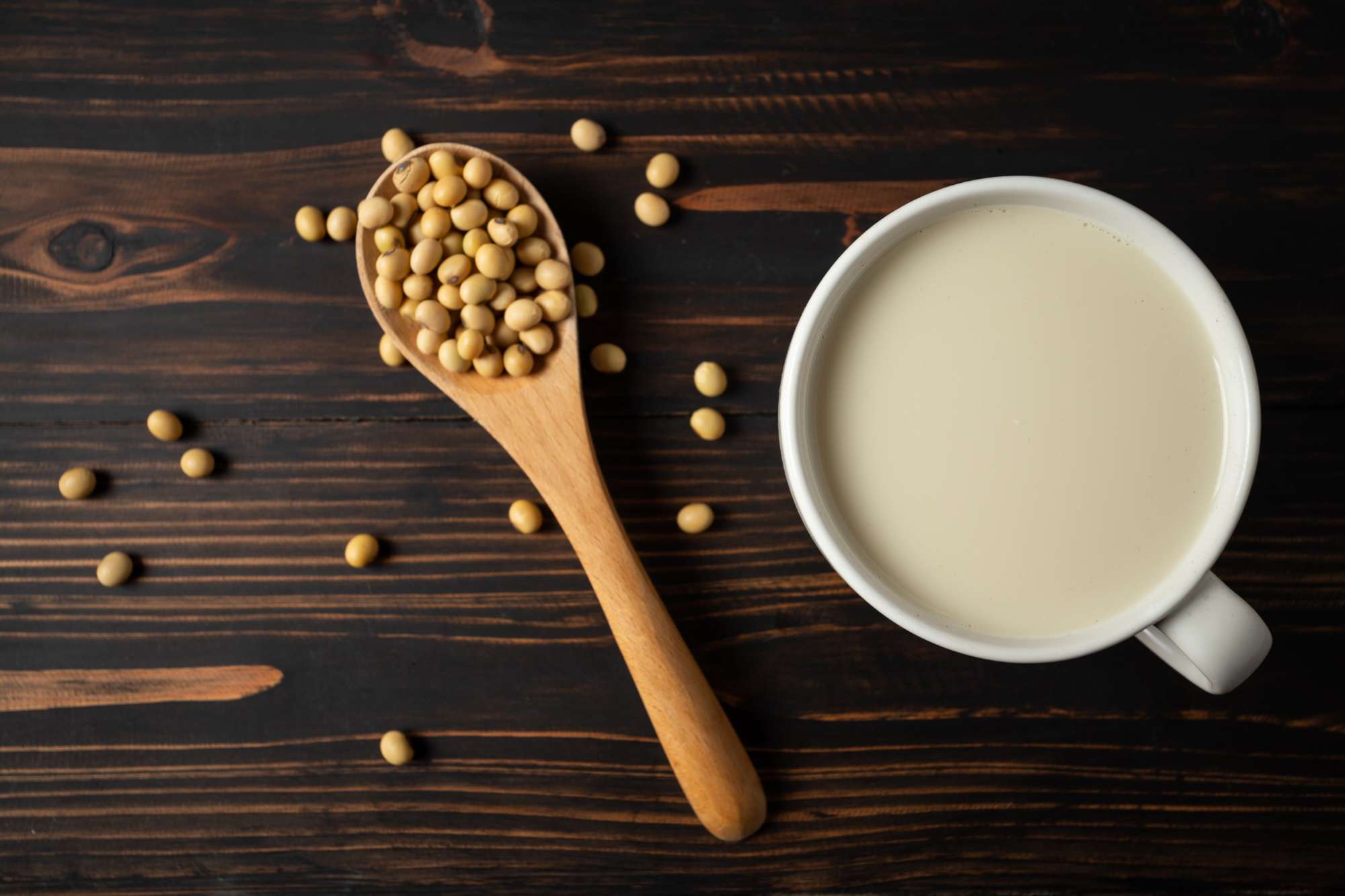
May help to lower inflammation
Inflammation is body’s natural healing mechanism against injuries and infections. However, when inflammation becomes chronic or long-term, it can be damaging and increase the risk of conditions like diabetes, heart disease, cancer, and rheumatoid arthritis.
Often, diet and chronic inflammation are closely linked. A diet rich in plant-based foods like soy has been shown to have anti-inflammatory effects and reduce the risk of chronic disease.
One review of seven studies found that consuming soy milk significantly reduced two major inflammatory proteins known as c-reactive protein and tumor necrosis factor (TNF). It’s thought that the isoflavones in soy milk inhibit the processes that generate these inflammatory proteins. Still, whether these observed reductions in inflammatory markers have a meaningful impact on health requires further research.
Supports brain health
Soy milk is rich in omega-3 fatty acids, this healthy fat your body cannot make on its own. Omega-3 fatty acids have been linked to a reduced risk of dementia and Alzheimer's disease. Soy milk is still being studied for its effects on these diseases, but in general soy is one of the best plant-based sources of omega-3 fatty acids.
Reduced menopausal symptoms
Soy milk contains isoflavones, which are a type of plant compound known as a “phytoestrogen”. These isoflavones react in the body like a weak form of estrogen. As a result, studies have shown that consuming soy milk and other soy products can help reduce symptoms of menopause, such as hot flashes.
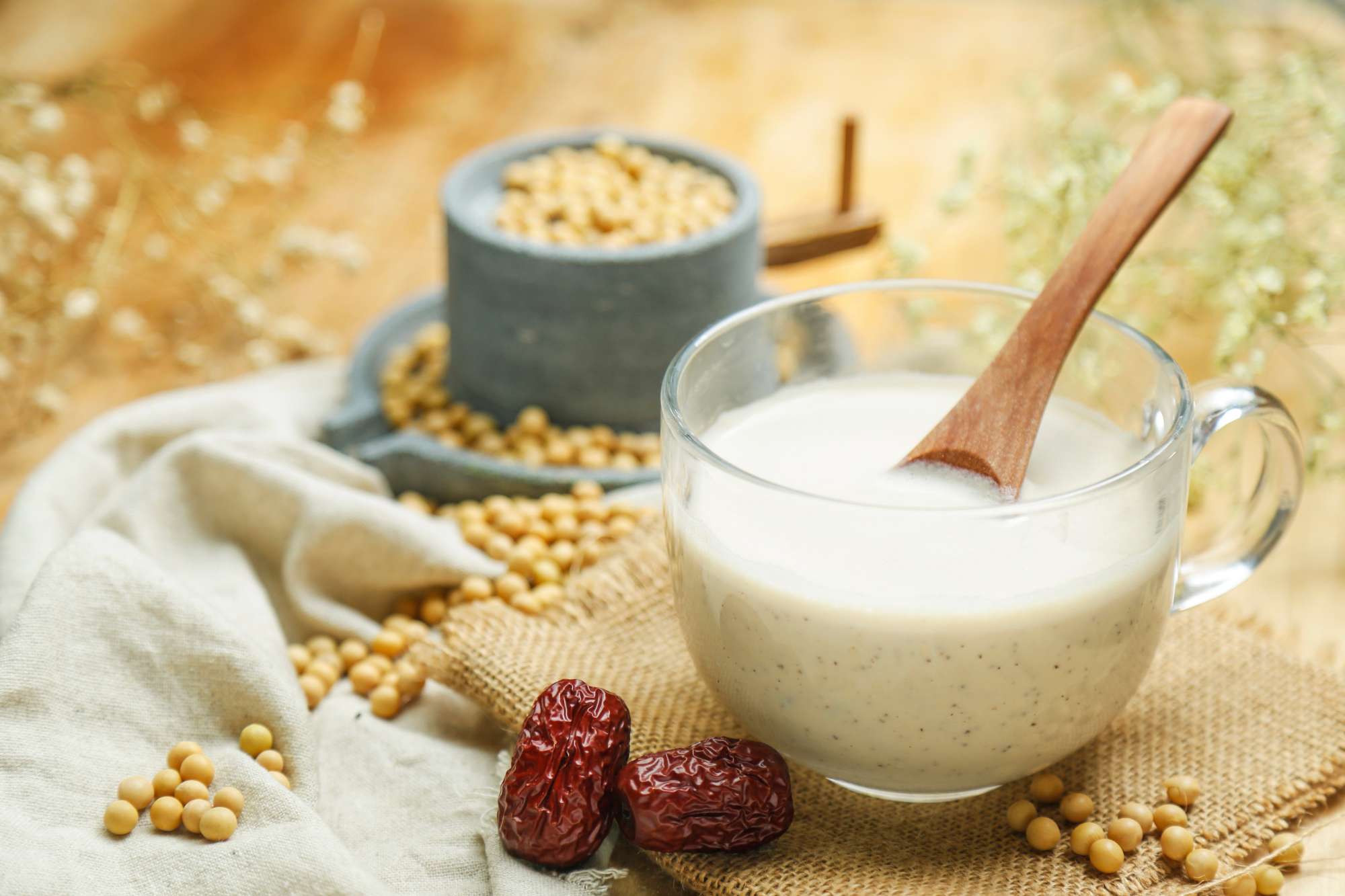
Support weight loss and weight maintenance
Losing weight comes down to eating fewer calories than your body needs to support normal bodily functions and activity.
While studies haven’t demonstrated consistent effects of soy milk on body weight, a cup about 240 mL of unsweetened soy milk contains just 80 calories, making it an excellent low-calorie choice.
In addition to being low-calorie, soy milk is also a great source of protein which have high quality. Among all sources of plant-based protein, soy protein has the highest biological value (can comparable to animal-based proteins like milk). This means it contains the essential amino acids, also known as the building blocks of protein, in the right proportions required by humans.
Protein offers three main benefits for weight loss: it promotes feelings of fullness, requires more calories than carbs or fats to digest and absorb, and helps you maintain muscle mass which means you may burn more calories at rest.
Drinking soy milk causes breast cancer?
Over the years, soy has been considered "may increase the risk of cancer, especially breast cancer". This is a common misconception based on animal studies that found that when rodents consumed high doses of isoflavones, they were more likely to develop breast cancer. According to the American Cancer Society, these animal studies may not be reliable, as rodents and humans process soy differently. At the same time in the studies, the researchers fed rodents an amount of soy with more many than that humans can get from food.
In fact, for those looking to diet to reduce their cancer risk, whole-grain soy foods are a smart addition. “Whole soy foods have been shown to decrease breast cancer recurrence and mortality in breast cancer survivors, and to reduce the risk of breast cancer and prostate cancers, as well,” says Hever.
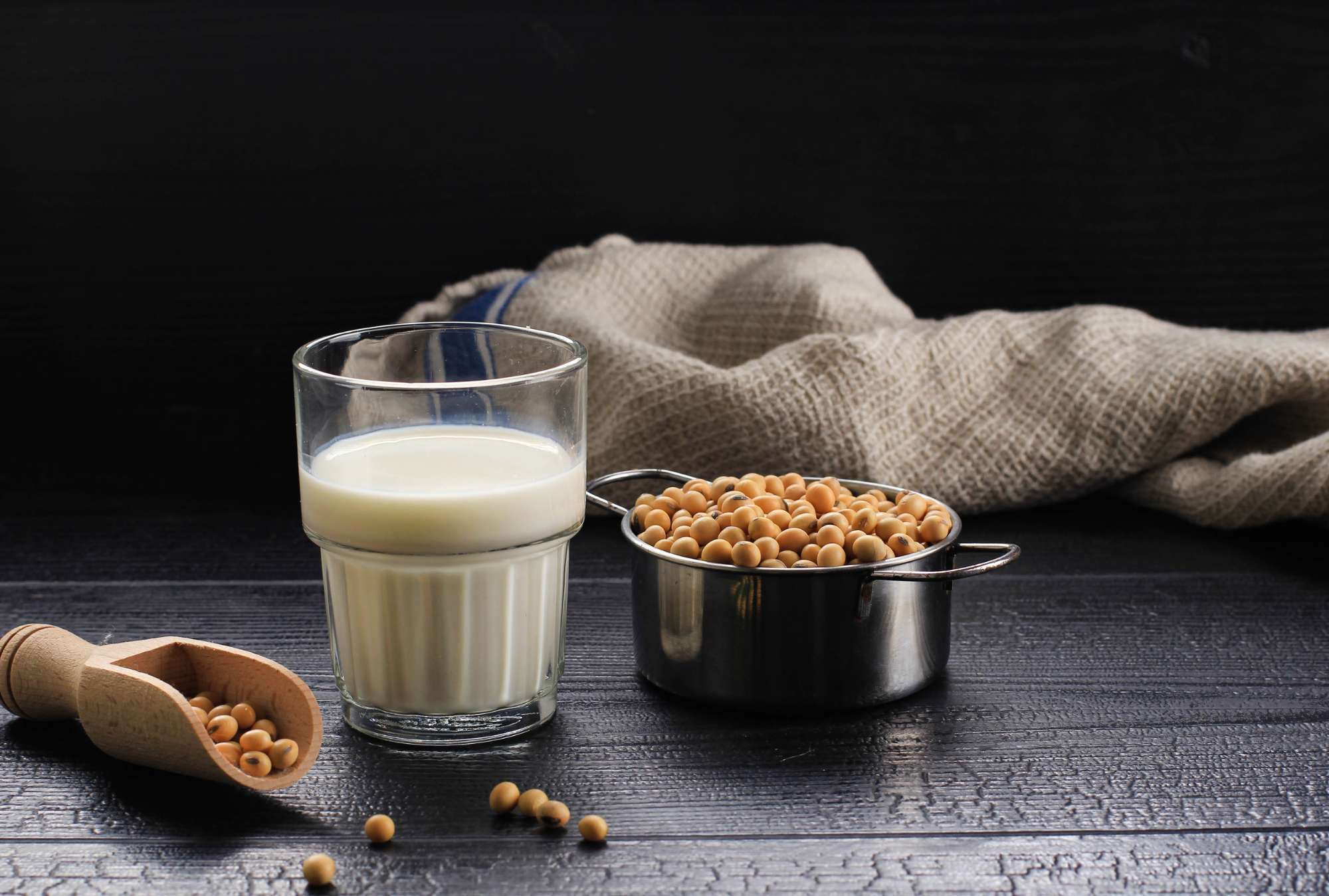
NEGATIVE EFFECTS OF DAILY SOY MILK?Like as other good foods, soy milk and soy products are hailed as superfoods, but through years of monitoring and research, experts have made a distinction between the "good" for us and the "dangerous" to our health. According to experts, drinking soy milk every day can be a good choice for most people, but can also come with some potential and long-term side effects from drinking soy milk every day.
May increase risk of chronic disease
According to Anya Rosen, a long-term cumulative negative effect of daily soy milk consumption is some manufacturers have added sugar and other potentially harmful ingredients to improve the taste and consistency of soy milk. And, do you know, taking too much added sugar over time can lead to poor blood sugar management, increasing the risk of chronic disease and illness, such as heart disease, kidney disease and certain cancers. So, when drinking soy milk, read labels carefully to avoid those with too much added sugar.
May interfere with nutrient absorption
Soy milk has some natural ingredients that slow the digestion of protein and carbs and can decrease the body's ability to absorb other necessary nutrients. These "anti-nutrients" include trypsin inhibitors, lectins and phytic acids, along with indigestible oligosaccharides.
"The phytic acids in soy milk can bind to iron, zinc, calcium, magnesium and potassium which then forms a complex that can't be absorbed by the intestine, making them less bioavailable," says Veronica Rouse, RD at The Heart Dietitian.
The long-term benefits of eating nutrient-rich foods like soy outweigh the negative effects of anti-nutrients found in them. According to the Harvard T.H. Chan School of Public Health.
.jpg)
Safe amount of soy milk for a day
You can feel confident in drinking soy milk, says Hever, who follows guidelines from the American Institute for Cancer Research (AICR) for moderate soy consumption: one to two servings daily of whole soy foods, including soy milk, edamame, soy nuts, and tofu. For instance, if you are planning on having a tofu stir-fry for dinner, you can still include 1 cup of soy milk in your morning smoothie. The AICR adds that studies indicate that consuming up to three servings of soy foods per day is not associated with a higher risk of breast cancer.


Important note when choosing soy milk
You need to consider the added sugar content of flavored varieties like cane sugar, chocolate... the amount of sugar can range from 5 - 15 grams per serving. While The American Heart Association (AHA) advises women to consume no more than 25grams of added sugar per day and men no more than 36grams.
Added sugars may not be harmful if consumed as part of a balanced, nutrient-rich diet. However, when consumed as excess calories, they can raise blood pressure, raise triglyceride levels, and contribute to unwanted weight gain.
Therefore, it's better if you choose soy milks with the lowest added sugars or choose unsweetened soy milk.
In addition, although soy is thought to decrease testosterone and increase estrogen levels in men, or increase the risk of breast cancer in women, but there is no strong or consistent evidence to support these claims.
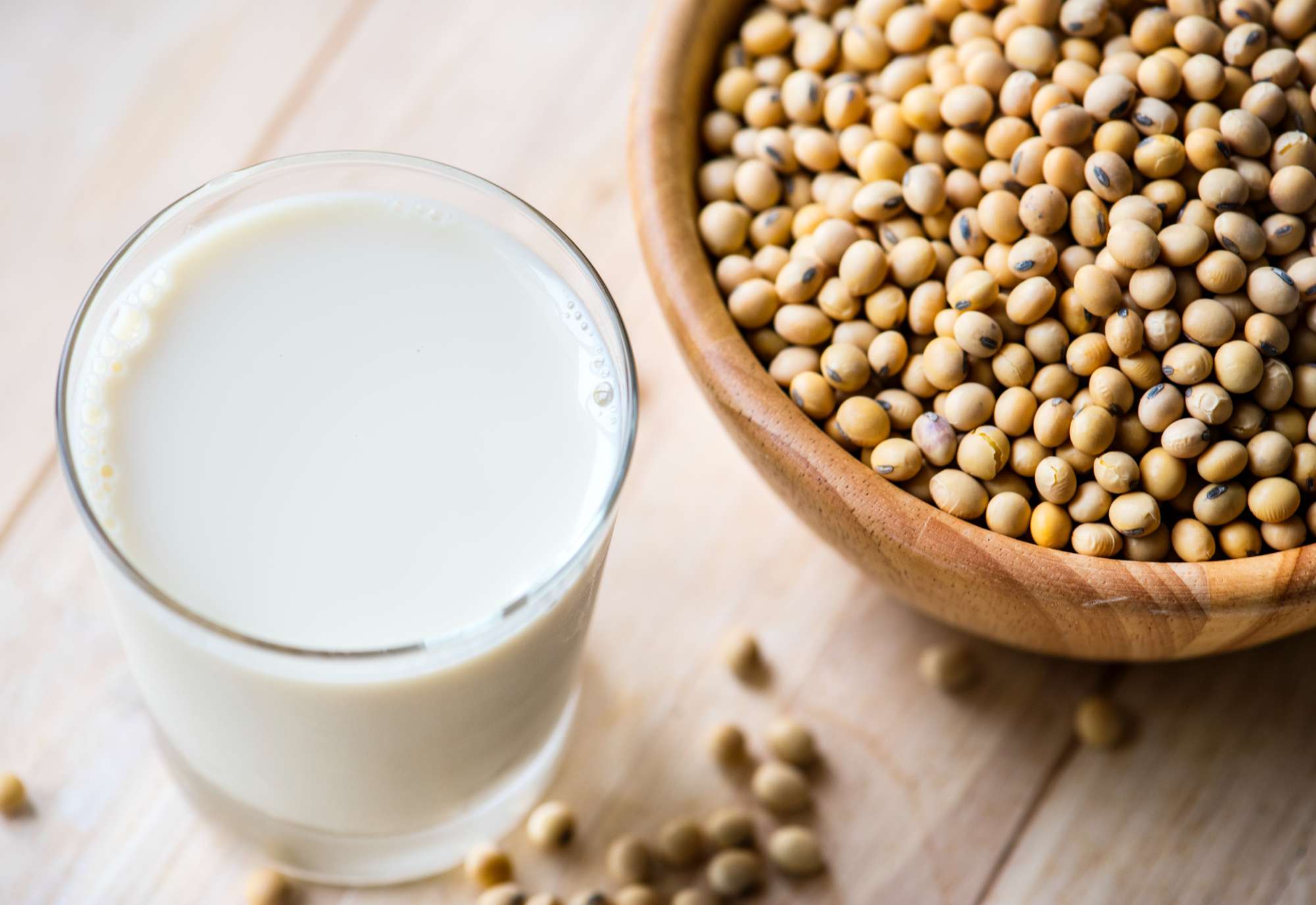
Side effects of soy milk:
Soy milk allergy may occurs. Symptoms indicating side effects of soy milk include: flushed skin, itching sensation, tingling sensation of mouth and lips, wheezing and shortness of breath, dizziness, nausea, diarrhea. When any allergic reaction occurs to you, contact your doctor immediately for helping.
Who should avoid soy milk?
Another consideration is thyroid disease. According to Harvard T.H. Chan School of Public Health, some research suggests that soy products may interfere with thyroid hormone replacement medications used to treat hypothyroidism, though soy isn’t thought to directly impact your thyroid’s natural hormone production. Talk to a doctor or endocrinologist before you incorporate soy milk into your diet if you have a history of thyroid disease, especially if you’re currently taking thyroid medications.
“Otherwise, it is an excellent food for everyone else,” says Hever. If you’re pregnant, you can consume soy. Likewise, if you have had breast cancer, it’s okay to consume a moderate amount of soy..
Compiled and penned by Crocus Media



